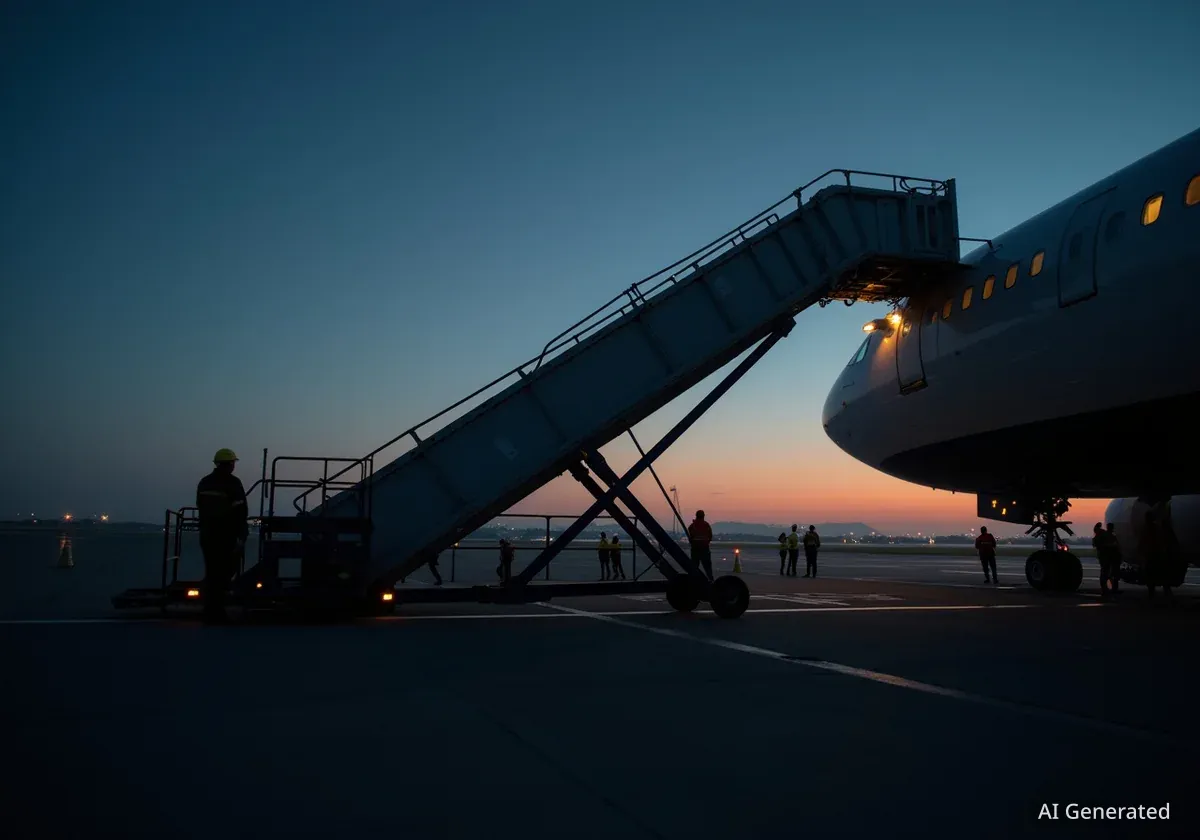A Delta Air Lines flight attendant inadvertently deployed an emergency evacuation slide on an Airbus A220 at Pittsburgh International Airport (PIT) on Saturday evening, October 25, 2025. This incident caused an estimated $70,000 in damage and delayed passengers preparing for departure.
Key Takeaways
- A Delta flight attendant accidentally deployed an emergency slide at Pittsburgh Airport.
- The incident caused an estimated $70,000 in damages and led to passenger delays.
- The crew member, a 26-year veteran, mistakenly activated the slide while arming the door for departure.
- Inadvertent Slide Deployments (ISDs) are not uncommon, with some data suggesting up to three per day globally.
- Airlines are exploring new safety measures, like British Airways' "point and call" method, to reduce human error.
Incident at Pittsburgh International Airport
The event occurred as the aircraft was preparing for pushback. Flight attendants were following standard pre-departure procedures, which involve arming the doors. During this process, a veteran crew member with 26 years of experience mistakenly lifted the door handle.
The door in question was the forward left-hand exit, which was connected to the jetbridge. Because the door system was armed, lifting the handle automatically triggered the emergency power assist function, causing the slide to deploy rapidly.
Costly Mistake
The estimated cost to replace an emergency evacuation slide for a smaller jet like the Airbus A220 typically ranges between $50,000 and $70,000. Even if a slide can be repacked, the process costs around $30,000 due to specialized manufacturer handling and inspection fees.
Operational Standstill and Passenger Impact
Once the slide deployed, it inflated directly against the jetbridge. This trapped passengers onboard the aircraft temporarily. Engineers had to manually detach the slide before the jetbridge could be reconnected, allowing passengers to disembark.
The flight attendant involved expressed deep regret over the incident. Such events, known in the aviation industry as Inadvertent Slide Deployments (ISDs), cause significant operational disruptions and financial burdens for airlines.
"The mechanism automatically forces the door open and deploys the slide within seconds, leaving no time to stop the process once engaged."
Understanding Inadvertent Slide Deployments
Inadvertent Slide Deployments are not rare occurrences within the global aviation fleet. Data from Airbus in previous years indicated an average of up to three accidental deployments per day across all aircraft types worldwide. Most of these incidents typically happen during the disarming phase after landing, as crew members prepare to open doors for arrival.
Despite strict cross-check procedures designed to prevent such errors, mistakes still occur. This is especially true at stations where a single flight attendant is responsible for the front door operations.
Beyond Financial Costs
The risks associated with ISDs extend beyond financial implications. An unplanned slide deployment upon arrival could lead to serious injuries for ground personnel or cause significant damage to nearby airport equipment, such as jetbridges or service vehicles.
Enhancing Safety and Preventing Human Error
Recognizing the potential for both financial loss and injury, some airlines have implemented additional safeguards to prevent ISDs. These measures focus on reinforcing crew focus and procedural discipline.
For example, British Airways adopted the Japanese "Shisa Kanko" method, also known as the "point and call" system, for door operations in 2023. This technique involves crew members physically pointing to controls and verbally confirming each action they take. Studies have shown that this approach can reduce human error by as much as 85%.
The Role of Continuous Training
While Delta has not yet announced any procedural changes following this latest incident, the event highlights the ongoing importance of continuous training and strict adherence to safety protocols in cabin operations. Airlines constantly review and update their safety procedures to minimize human error and ensure passenger safety.
Maintaining a strong safety culture is paramount in the airline industry. Every action, no matter how routine, requires full attention and adherence to established guidelines to prevent costly and disruptive incidents.
- Review of existing pre-departure and post-arrival procedures.
- Consideration of new error-reduction techniques like "point and call."
- Continuous training and re-training for all cabin crew members.
- Emphasis on team coordination and cross-checking procedures.





